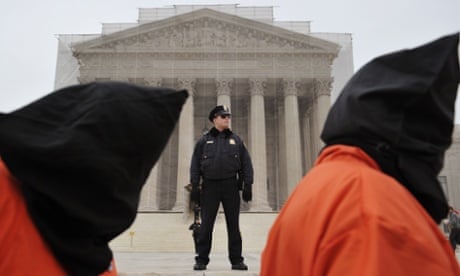Tensions continue to rise at Guantánamo, where the US military acknowledges that 39 detainees – nearly one-quarter of the 166 prisoners – are engaged in a hunger strike. Attorneys for detainees say the number is significantly higher. Although the hunger strike has attracted international attention, it should come as no surprise given the sense of despair that pervades the prison.
Detainees claim that guards mistreated their Qur'ans during routine cell searches. The military denies the allegations, maintaining that guards followed established procedures and treated the Qur'ans respectfully.
The truth may never be uncovered. But it is largely immaterial. The real cause of the hunger strike is that after more than a decade of confinement, all but a handful of the remaining prisoners have not been charged with a crime and do not know when, if ever, they will be released.
Guantánamo, to be sure, has come a long way since the first prisoners were taken there in early 2002 and placed in outdoor cages. The last decade has witnessed a historic struggle to bring law to a law-free zone. Notable victories include US supreme court decisions upholding the right to habeas corpus, thus guaranteeing prisoners the opportunity to present their case to a federal judge.
But rights have made little practical difference. Lower courts have chipped away at the supreme court's rulings, interpreting habeas corpus narrowly and upholding continued imprisonment based on slim and often unreliable evidence. They have ruled, moreover, that even when detainees win, they lose – because judges lack the authority to order their release from the base. The supreme court has shown no desire to intervene again.
Eighty-six prisoners – more than half of the remaining population – have been cleared for release by the Obama administration. But Congress has imposed draconian restrictions on the president's ability to transfer these prisoners to other countries. The president has regrettably yielded to these restrictions. Earlier this year, the administration shut down the office it had established to implement his order to close Guantánamo, signaling that the president has effectively abandoned his promise.
The public, meanwhile, has grown increasingly complacent. It has accepted the rationale that suspected terrorists need not be tried and sentenced like criminals, but can be held indefinitely as wartime prisoners in a war seemingly without end.
Even legal victories have become obstacles to release. Last year, a federal appeals court ruled that the government could not prosecute detainees in military commissions for materially supporting a terrorist organization because this offense is not recognized as a war crime under international law.
At first blush, the decision seems to benefit low-level detainees who form the bulk of Guantánamo's prison population. They never plotted or committed a terrorist attack, but might otherwise have been charged with providing material support, based, for example, on attending an al-Qaida-affiliated training camp years ago.
Appearances, however, are deceiving. Being prosecuted as a war criminal has provided one of the few ways out of Guantánamo for low-level detainees who have typically been released soon after their conviction. That avenue no longer exists.
As a lawyer, I worked on legal challenges that established the right to habeas corpus at Guantánamo. I defended habeas as the most important check in the constitution against arbitrary imprisonment by the government. And I celebrated judicial victories as vindications of the rule of law and important steps towards justice.
But detainees do not just read about court decisions; they experience them. And they experience law at Guantánamo as, at best, ineffective and, at worst, a trap. Law has helped to legitimize Guantánamo without altering the reality of the prisoners' continued confinement.
A hunger strike provides detainees with a way to reassert some measure of control over their own lives. By refusing to eat, they force the world to recognize their existence and humanity and to confront the reality of their continued imprisonment. Legal rulings can be rationalized or ignored in a way that a dying prisoner cannot.
The latest hunger strike demonstrates that the problem of indefinite detention will not disappear, even if courts grow silent. It underscores – more powerfully than any legal brief can – that the only solution to Guantánamo lies in charging the remaining prisoners with a crime or setting them free.
